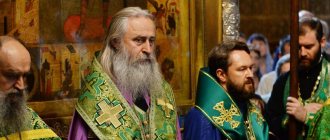How to contact a priest correctly?
In person he should be addressed as "Your Beatitude" (except in Lisbon, where he is addressed as "His Eminence"), or on paper as "His Beatitude, the Most Reverend (Name and Surname) Patriarch of (Location)".
Interesting materials:
What words can serve as introductory words? What words can you choose for the word winter? What words can you choose for the theme of autumn? What words can you say to a girl before going to bed? What words can you say to your mother on her birthday? What words can be said at a wake? What words can be made from the word trifle? What words can be made from the word sandwich? What words can be formed from the word hematogen? What words can be made from the word peephole?
What do the names of church ministers mean?
In the church environment you can hear a variety of appeals to church servants. The main character of any worship service is the priest. This is the person who is in the altar and performs all the rites of the service.
About the rules of behavior in the temple:
- Rules for visiting the temple
- Sacrament of Confession: rules
- Is it possible to receive communion without confession?
Important!
Only a man who has undergone special training and ordained by the ruling bishop can become a priest. The word “priest” in the liturgical sense corresponds to the synonym “priest.” Only ordained priests have the right to perform the Sacraments of the church, according to a certain order. In official documents of the Orthodox Church the word “priest” is also used to designate a particular priest.
Among the laity and ordinary parishioners of churches, you can often hear the address “father” in relation to one or another priest. This is an everyday, simpler meaning; it indicates a relationship with parishioners as spiritual children.
If we open the Bible, namely the Acts or Epistles of the Apostles, we will see that very often they used the address “My children” to the people. Since Biblical times, the love of the apostles for their disciples and the believing people was comparable to fatherly love. Also now, parishioners of churches receive instructions from their priests in the spirit of fatherly love, which is why the word “father” has come into use.
Father is a popular address to a married priest
“Woe to the priest who accumulates wealth for himself or seeks power.”
Archpriest Vladimir Vorobyov.
Photo from the site priest.today Archpriest Vladimir Vorobyov , Moscow:
– The priest carries within himself the image of Christ. Therefore, the ministry of a priest is the ministry of Christ. And the ministry of Christ was the ministry of a priest, a king and a prophet-shepherd.
Firstly, this is a mediatory ministry, connecting man and God, heaven and earth. Unlike the Old Testament clergy who offered sacrifices to God, Christ, in order to unite man and God, offered Himself as a Sacrifice.
And the priest, as the image of Christ, in his ministry also becomes a victim; he, like Christ, sacrifices himself.
Every priest must be, first of all, a clergyman - a performer of the Sacraments. Through him the grace of the Holy Spirit is given to this world. Even Christ was not baptized in the Jordan Himself, but was baptized by John the Baptist.
So we also need a priest to perform the Sacraments, through which the grace of God is sent to a person, and he enters into mysterious communion with the Creator.
Secondly, the ministry of a priest is a royal ministry. Like Christ, who led the people, the priest is the leader of his flock. Of course, a leader in spiritual life, not socio-political. The priest must lead the people to God, to good, as someone in power.
Thirdly, the ministry of the priest is a prophetic ministry. This is the ministry of preaching, witnessing the Truth. And here the priest also becomes like Christ - he must show love and care, but also reprove and teach.
All the services of a priest are important, and to single out just one would, in my opinion, be wrong. But I would once again emphasize the sacrifice of priestly service. This, if you like, is an inevitable pattern of normal priestly service.
This can happen in an obvious way - during times of persecution of the Church, or simply in everyday life, when a priest gives all of himself to people. This is the law of life. The world is so structured that without sacrifice nothing good can be accomplished.
The priest must understand this and should not be afraid of death. He must be willing to sacrifice himself because he bears the image of Christ within himself.
And woe to the priest if he forgets that he serves God and begins to accumulate wealth for himself or seek power. Then he accepted the gift of the priesthood in vain. The gift, of course, is difficult and obliging to many things, but at the same time it brings so much joy and consolation, so much love of God and people that a real priest will never regret choosing his path.
There is an expressive custom in the Russian Church: when an ordination to the priesthood takes place, the bishop takes off the ordained person’s wedding ring and places it on the throne - as a sign that from now on he already belongs to God, and even his family fades into the background.
Why don't priests wear wedding rings?
Wedding rings are a symbol of belonging: a man belongs to a certain woman, a woman belongs to a certain man. A priest is a person dedicated to the special service of God. The Sacrament of the Priesthood can in some sense be compared with the Sacrament of Marriage. Just as during a wedding, the candidate for clergy is led three times around the throne (in the Sacrament of Marriage, the newlyweds are led around the central lectern), the same chants are sung as during the wedding: “Holy Martyrs...”, Glory to Thee, Christ God...”, "Isaiah, rejoice..." All this is a symbol of the fact that the soul of the priest is, as it were, married to God and has already been given to Him forever. It is service to the Lord that will become the main goal of the priest’s life in the future. A sign of this is the fact that after the transubstantiation of the Holy Gifts the young priest is given the paten with the Body of Christ to hold. The priest will now belong entirely to Christ and Him alone, to serve all his life. That's why the priest doesn't wear a wedding ring. His sign of belonging is the pectoral cross.
Additional synonyms (40)
cleric, priest, missionary, clerk, bishop, rector, monk, clergyman, archbishop, prelate, clergy, rank, clergyman, priesthood, deacon, deacon, surplice, psalm-reader, clergyman, sexton, sexton, protodeacon, patriarch, bishop, metropolitan, Catholicos, pontiff, saint, archimandrite, monasticism, theologian, sacrament, psalmist, clerk, shepherd, minister, elder, pope, teacher, leader
Didn't find the synonym you need?
1. Sentences "priest". 2. The meaning of the word. 3. Antonyms for “priest.” 4. Printing, . 5. Rhymes. 6. “Priest” associations.
With the same beginning: missionary priest, priest-priest, Jesuit priest, Protestant priest, Unitarian priest
With the same ending: high priest, roasted priest, monk-priest, writer-priest
Other words that start with s, words that start with s, and words that end with k
Synonyms:
Top ↑ Dictionary of synonyms Association Dictionary of antonyms
Where did the Sacrament of Priesthood come from, how did it come about?
It came from our Lord Jesus Christ Himself and His apostles. The Apostle Paul asks his disciple Timothy: I remind you to rekindle the gift of God, which is in you through my laying on of hands (2 Tim 1 :6). If this were not in full accordance with the words of the Lord, the Apostle Peter and other closest disciples of Christ would certainly have opposed and prohibited this practice. The early Christians did not leave detailed comments on this issue in writing: everything was clear and obvious to them by default. And we sacredly preserve this Apostolic and church-wide Holy Tradition.
Why are intermediaries needed in communication between man and God?
The idea that a priest is only an intermediary in communication between God and man is erroneous. When two people communicate through an intermediary in everyday life, there is no personal contact between them. But a person can and must communicate with God himself, and the New Testament speaks of closeness to the Lord’s people. God expects this communication from us, God expects our spiritual self-improvement from us. As for priests, as performers of the Sacraments, this ministry was founded by Christ. The Lord Himself blessed our earthly world to have the priesthood.
What are the requirements for a future priest?
Only male persons professing the Orthodox faith and having experience of church life can be admitted to the priesthood. The degrees of the priesthood can only be completed sequentially: one cannot be ordained immediately to the priesthood after passing the degree of deacon. Both those married in their first marriage (they must be married before ordination) and celibate candidates can be ordained priests. After being ordained, marriage is prohibited. Priests are usually ordained no earlier than 25 years of age. You also need to have the necessary knowledge and have high moral qualities. See full list of requirements.
"Comfort God's People"
Archpriest Evgeny Popichenko.
Photo: vk.com/evgeniy_popichenko Archpriest Evgeniy Popichenko , Yekaterinburg:
– The Apostle Paul in his Epistle to the Corinthians has the following words: if you have an apostolic talent, or speaking in tongues, or interpreting tongues, or a prophetic gift, or a teaching gift, serve God with the gift that you have.
And then the apostle continues: “Be zealous for great gifts.” But. “If I speak in the tongues of men and of angels, but do not have love, then I am like a ringing brass or a clanging cymbal.” (1 Cor. 12:31 - 13:1)
Be jealous of greater gifts. We remember the words of Seraphim of Sarov: acquiring the grace of the Holy Spirit is the goal of Christian life; and everything else is means: rule, fasting, and acts of mercy.
And therefore it is important to find for yourself that activity that brings maximum spiritual benefit, brings gifts of God’s Grace; feel what the Lord calls to.
Serving the Liturgy for the pastor should, of course, be the core.
Love worship, do not put it off, do not run away from it, do not formalize it. Learn to love prayer. A priest who doesn’t like to pray is in the wrong place. Prayer gives life, gives strength, energy to carry out one’s service.
And the priest is also a guide; in acquiring or acquiring the Grace of God, he must share.
Therefore, the second main thing for a priest is serving people, shepherding. As the prophet Isaiah said: “Comfort, comfort the people of God.” The priest is the comforter of the people. This is helping people find their way to Christ, to the Church.
It seems to me that these are the main two things that you need to find in your life: learn to love and be with God, and learn to love and be with people.
What is apostolic succession?
One of the four essential properties of the Church, without which it cannot exist, is apostolate. This property essentially means that the Church always remains internally identical to the Church that it was under the apostles. However, this identity is determined by a number of very important external and internal characteristics, one of them is apostolic succession.
The priesthood is not inherited: priests are not born, but become. The acquisition of the grace of the priesthood occurs in the Church Sacrament. During this Sacrament, the bishop places his hands on the candidate’s head (hence the name of the rite - Ordination) and reads special prayers, thus becoming, as it were, the “father” of the newly ordained priest. If we trace the “family tree” of such ordinations into the depths of the past, we will discover why we are talking about apostolic succession. The fact is that, having reached the beginning of this chain of ordination, we discover an amazing fact: each ordained clergyman has one “ancestor”. This “ancestor” will be one of the twelve apostles of Christ.
Apostolic succession is one of the conditions that the Church is grace-filled, that the Sacraments are actually performed in it, which means that it fulfills its purpose - to lead people to salvation. However, apostolic succession is not limited to the unbroken chain of ordinations itself. Another condition is also necessary: the Church must preserve the doctrine that it received from the apostles (and the apostles from Christ Himself). Without this, no genuine apostolic succession exists.
Share happiness
Bishop Anthony (Azizov).
Photo from wikipedia.org Bishop Anthony (Azizov) , Akhtubinsk:
– I think that the main thing is the service of the Divine Liturgy.
If the Liturgy is perceived not only as a divine service, but also as attention to people, attracting people, building the Church, this is the main purpose of the clergy.
And every time you perform the Divine Liturgy, you burn with a cleansing fire. And in this fire of Divine Love everything is burned. Therefore, the shepherd, despite all his weakness, celebrates the Divine Liturgy with love, without any burden, and emerges after the Liturgy as if born again.
The laity probably do not have such an opportunity. They also burn, receiving the Divine Fire in Communion, but this fullness is not there. In Anaphora at the Liturgy of St. Basil the Great has words when the priest thanks God for this opportunity to contemplate the fullness of the Divine Liturgy.
And you should always want to share this happiness with others. This is the purpose of the shepherd: to share the happiness of experiencing God.
Clerical expenses
The hero of our story has a family - a wife and 3 children. The wife works part-time at a school (teaching a few hours) and receives 5,000 rubles for this. The state also pays the family child benefits.
The main part of our friend’s expenses is food . 30,000 rubles a month on them . Our friend does not consider it necessary to save on food. Also, sometimes he takes home food that parishioners bring to the temple.
According to the clergyman, he spends about 10,500 rubles utility costs . He spends another 10,000 rubles pay for clubs for children (drawing, music, sports clubs).
The clergyman’s family spends 5-7 thousand rubles on children’s clothing . Often my wife orders things online. Clothes for the hero of our story are cheaper. He wears mainly a cassock and a cassock (you can wear anything under them). When a clergyman buys ordinary secular clothes for himself, he prefers things that are more expensive, but of good quality. They will then be able to play 5-7 seasons. If you buy clothes at a discount center, you will have to change them after 1-2 seasons.
The priest's family spends 5-7 thousand rubles cafes . They most often go to catering establishments on the eve or after fasting. About 5,000 rubles are spent on car maintenance, 2,000 rubles on other transportation costs .
The clergyman pays another 2,000 rubles for sports activities . As a result, his total monthly expenses are 68-69 thousand rubles .
saves from 30 to 50 thousand rubles monthly . Unforeseen expenses, insurance, car repairs, and vacations are paid from the created fund. For example, a priest’s family spent 100,000 rubles on a trip to Crimea. Sometimes I manage to go to a holiday home for a couple of days.
The clergyman is also saving money for a down payment on a mortgage . His dream is to buy himself a private house near the temple.
What types of activities are not recommended or prohibited for priests?
Having as the main goal of their ministry the revival of human souls and leading them to the eternal Kingdom of God, priests should not be distracted from the work of the apostle and waste time on worldly affairs. There are canons prohibiting activities that are incompatible with high service, for example: indulging in drunkenness, participating in gambling and indecent festivities, raising a hand against a person (even an offender), holding public and government positions, being in military service, engaging in usury and trade (especially alcohol). The main purpose of such requirements is to protect the priest from anything that could serve as a temptation to others.
Total
As we see, a modern priest of the Russian Orthodox Church can organically combine reliance on tradition and the use of technical innovations. He drives a car, tracks expenses on a mobile app, buys clothes online, insures himself against risks, plays sports and saves money for a down payment on a mortgage.
As our hero’s story shows, Orthodox priests earn good money and deny themselves practically nothing. Although not everyone has cars and watches that cost “many millions.”
At the same time, the clergyman is most concerned about the salvation of the soul (his own and those of his parishioners), about gaining eternal life in the Kingdom of Heaven. And this is no longer entirely typical for a modern person living in eternal bustle. And the relationship with management (as in the world) has a greater impact on the amount of a priest’s material income.
moneyzz.ru
Heading:
People and money. About personal finance and success stories
Tags:
PERSONAL EXPERIENCE WORK
Cardinal
Cardinals are the leading bishops and members of the College of Cardinals. Their duties include participating in the Papal Conclave, where they vote for a new Pope.
But most of them also have other responsibilities, such as missions to the Roman Curia, which is the governmental body of the Holy See. Cardinals are personally elected by the Pope. Cardinals live either as bishops in their sees, or in the Vatican as papal advisers and senior officers in the Roman Curia.
The names of such cardinals are not disclosed. To vote, a cardinal must be no more than 80 years old. The current Pope Francis has a fairly large group of diverse cardinals, if you can call old male Catholics a diverse group.
In total, the Pope has 128 cardinals. He collected them from 88 countries, 17 of which had never before been represented in the College of Cardinals.
Last year, Pope Francis appointed several cardinals whose responsibilities included addressing issues of caring for migrants and relations with Islam. Now the meeting of cardinals, the consistory, is a very important corporate body.
Income of a priest of the Russian Orthodox Church
And now about how much clergy are paid for their work. The hero of our story, in the rank of priest, receives a salary of 60,000 rubles . This is a good salary for a clergyman of the Kolomna diocese, located in the Moscow region. The priests of the Russian Orthodox Church do not have a single rate. The salary for ordinary priests (and for themselves too) is set by the rector of each specific temple . At the same time, he proceeds from the size of donations collected from parishioners and “in accordance with his conscience.”
An Orthodox church in a big city can receive up to 1 million rubles a month in donations. Parishioners donate significantly less to churches in the provinces. The rector sends part of the proceeds (about 25%) to the higher diocese. The funds collected also go towards repairs and construction of buildings and for other purposes. Many Moscow priests most likely receive a salary greater than the hero of our story. The further into Russia you go, the lower the income of clergy becomes (as in the world).
Significant additional income ( from 35 to 50 thousand rubles per month ) for the clergy is brought by the so-called private services . This is the lighting of new cars, apartments, communion at home. The number of such requirements depends on the size of the temple in which the priest serves. It is also important how the clergyman behaves with parishioners. If he is an open person and enjoys making contact with others, then he has more requirements.
The hero of our story does not have his own price list for his needs . The priest lives by the principle: “Never ask for money for your needs, but if they give it, don’t refuse.” That's what he was taught in seminary. For lighting an apartment, for example, he is paid from 500 to 3,000 rubles. There are cases (rarely) when clients do not pay for requests at all. And once he was given 30,000 rubles for lighting a car. The clergyman does not abuse his position. No one has yet written off the apartment for his soul.
The priest receives an income of 5-7 thousand rubles for obediences . This could be working in a diocesan department (religious education, missionary work, restoration and construction) or teaching in Sunday school.
As a result, the income of a priest from the Moscow region can reach 117 thousand rubles per month .
Also, clergy can engage in business if their activities do not violate the Charter of the Church (do not condone the development of drunkenness, fornication and other human vices). For example, one temple rector raises cows and sells dairy products to his parishioners.
As for the “cool cars” and “expensive watches” of priests, then perhaps the rectors of churches in large cities have all this. But, according to our hero’s estimates, there are about 3-4% of the total number of clergy. The remaining 96% of priests live more modestly.









